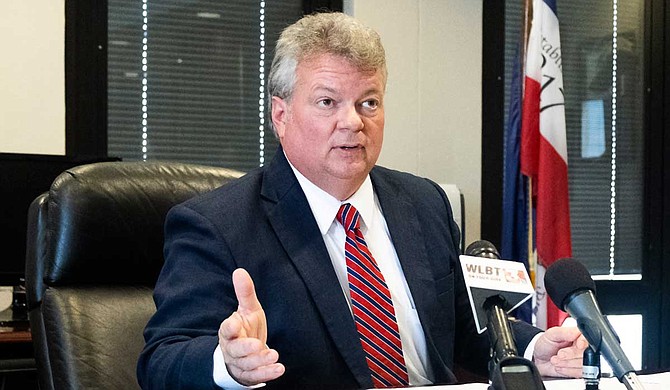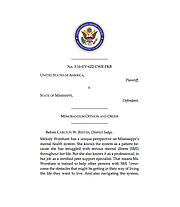Mississippi Attorney General Jim Hood speaks to reporters during a press conference in his office in downtown Jackson, Miss., on Sept. 4, 2019. Hood responded to U.S. District Court Judge Carlton W. Reeves' ruling that Mississippi is violating the civil rights of residents with mental-health issues. Photo by Seyma Bayram
Hours after a federal judge ruled that the State of Mississippi's mental-health system violates the Americans with Disabilities Act, Mississippi Attorney General Jim Hood told reporters that he "knew this was coming."
Speaking from his office in downtown Jackson, Hood pointed to years of letters he had sent to the Mississippi Legislature, and Lt. Gov. Tate Reeves specifically, expressing concern about the mental-health system, as well as more than $267 million that his office had won in settlements, some of which he had urged the Legislature to allocate to the Mississippi Department of Mental Health. But the Legislature did not heed his advice, he said.
"If you don't care about the people from your heart that have mental-health issues ... then you ought to care for your pocketbook, but the Legislature didn't," Hood, who is the Democratic nominee for governor this year, told reporters. "They gave (the money) away to out-of-state corporations and all these tax breaks, and so all this 267 million that I gave over there, they didn't put a dime towards mental health."
In 2016, the Legislature passed a tax-cut package that killed the franchise tax, which brought $260 million to state coffers each year from out-of-state corporations. Since the first day of his campaign, Hood has made a point of criticizing his Republican opponent, Lt. Gov. Reeves, for pushing for the cuts as president of the Mississippi Senate, while leaving necessities like education, roads and bridges, and the state's mental-health system underfunded.
The Jackson Free Press left several unanswered messages with Tate Reeves' campaign for comment Wednesday evening and Thursday morning, but the campaign did not respond.
U.S. District Court Carlton W. Reeves' ruling on Sept. 4 found that Mississippi's mental-health system violates federal law under Olmstead v. L.C., the 1999 U.S. Supreme Court ruling that found that "states are required to provide community-based treatment for persons with mental disabilities when the state's treatment professionals determine that such placement is appropriate, the affected persons do not oppose such treatment, and the placement can be reasonably accommodated, taking into account the resources available to the state and the needs of others with mental disabilities."
The 61-page opinion found that the State relies too heavily on psychiatric hospitals it runs rather than community-based services, which it found to be severely lacking in Mississippi. This has led to the unnecessary confinement and segregation of people with mental-health issues, both in hospitals and in jails. Judge Reeves ordered the State to appoint a special master within 30 days to oversee sweeping changes, particularly in the area of community-based treatment services.
Mental Health Infrastructure Lacking in Mississippi
On Wednesday, Hood told reporters that other states such as Georgia, Virginia, Delaware and North Carolina have faced similar lawsuits. While those states had the infrastructure to provide mental-health services but chose not to, Mississippi does not have the resources to deliver services, he said.
"What I kept trying to explain to the Department of Justice (was that) in Mississippi, we didn't have the capabilities of providing (services) because we don't graduate enough psychiatrists every year, for example," Hood said at the press conference.
Among the evidence presented at trial was the fact that Mississippi does not have Programs of Assertive Community Treatment, called PACT, in 68 of its 82 counties. This kind of intensive community-based treatment is aimed at those who exhibit severe mental-health issues and have not improved with traditional outpatient programs. A map included in the opinion shows that those most vulnerable to hospitalization live in regions without PACT services.
Other evidence included remarks from Sheriff Traves Patten of Adams County who testified that he has never seen mobile crisis services respond to crisis incidents in his county. Instead, the Adams County Sheriff's Department responds to mental-health crises.
The distribution of psychiatrists in Mississippi—5.3 for every 100,000 people—is lower than the national average of 8.9, a 2015 report from the medical consulting firm Merritt Hawkins found.
Hood: 'Gravely Concerned' About Mental Health Litigation
Hood told reporters at the press conference that, beginning in 2013, he sent a series of letters to the Legislature, advising it to use funds that his office had won in settlements to implement the changes the U.S. Department of Justice recommended.
In separate Feb. 11, 2013 letters to Lt. Gov. Reeves and Mississippi Sen. Eugene Buck Clarke and House Rep. Herb Frierson, who chair appropriation committees in their respective houses, Hood wrote that he was "gravely concerned about potential litigation by the Department of Justice (DOJ) against the State of Mississippi for our alleged failure to sufficiently deliver mental health care into the communities." He recommended "appropriating an additional $10 milion during this session to the Department of Mental Health (DMH) to keep us out of court for one year."
Hood drafted 11 additional letters between 2013 and 2019 detailing his recommendations to the Legislature to allocate millions of dollars in settlement funds toward a variety of civil, criminal justice and educational issues, including mental-health expansion, inmate re-entry, a judicial performance commission, supportive housing, substance-abuse treatment, attorney general's office employee pay, mental-health crisis response training for law enforcement, scholarships at the University of Mississippi Medical Center to support the study of psychiatry, adolescent residential treatment centers and outpatient programs.
Hood told the Jackson Free Press late last month that Mississippi does not have enough trained psychiatrists to deal with its mental-health needs. He claimed that, to date, $267,769,755.44 total in funds could have paid to build out Mississippi's mental-health infrastructure, a significant portion of them stemming from settlements his office had won in court cases, including against pharmaceutical and tech companies. But the Legislature did not listen, Hood said.
"I advised the lieutenant governor that, you know, not only have I recovered money that will cover some of these costs, but more importantly, the expansion of the Affordable Care Act would have ... covered all of the costs," Hood said. "We showed how that would happen, because people that are (insured) would have been able to pay the community health centers, and that would have been $91 million alone just the community mental health centers would have collected as well as the Department of Mental Health."
Hood was referring to a DMH estimate that he cited in the 2013 letter, which found that community-health centers would generate an additional $91 million per year from people insured through Medicaid expansion.
Hood: Medicaid Expansion Could Fund Mental Health
Since launching his campaign last October, Hood has made the push to expand Medicaid in the state. That could bring health-care access to an additional 300,000 Mississippians who are unable to afford private insurance but live in households that make too much for traditional Medicaid. The federal government has allocated more than $1 billion to cover the cost of Medicaid expansion in Mississippi each year since 2013, but Gov. Phil Bryant and Lt. Gov. Reeves have repeatedly rejected those funds.
In January, Tate Reeves reiterated his opposition to expansion, saying, "I am against Obamacare expansion." The expansion funds are part of former President Barack Obama's 2010 Affordable Care Act. The federal government would cover 100% of the costs of expansion for the first few years, asking Mississippi to pay just 10% of the cost in later years.
In the Republican primary, Lt. Gov. Reeves attacked opponent Bill Waller for supporting expansion with dishonest mailers that falsely portrayed him as a liberal Democrat.
But on Wednesday, Hood said Mississippi's mental-health system would not be in the shape it is in today if Lt. Gov. Reeves had supported Medicaid expansion.
"Had we been smart and taken that billion dollars a year from the federal government, we could have avoided this lawsuit and settled it," Hood said. "That's what I tried to get the Legislature to do, but because of politics and whose idea the Affordable Care Act was, they did partisan politics and they didn't accept that billion dollars."
Hood said his office worked with the U.S. Department of Justice, which brought the lawsuit, for years attempting to avoid the lawsuit.
"We tried, we worked with them well for several years," he said. "And I think they would have let us keep on trying to build out our housing program and graduate more people who were capable of providing those services out in the community.
"But when the Legislature made all those cuts over there, so they (could get) that $416 million a year tax break, that's when they cut those ... positions (at the State Hospital) and bam," he continued, snapping his fingers. "That's when they filed the suit, and that's where we are now after litigating it. So it wasn't really a surprise, the decision of the court. But we'll wait and see if there will be an appeal, but I think we are in a position where we're going to have to accept a billion dollars a year to keep our rural hospitals open and pay for this litigation."
Half of Mississippi's rural hospitals are in danger of closing, in part because of the State's decision not to expand Medicaid, leaving struggling rural emergency rooms flooded with patients showing up for non-emergency care but unable to pay for treatment.
In Hood's 2013 letter to Lt. Gov. Reeves, he warned that Mississippi was in danger of repeating the past.
"In my first legislative session as Attorney General in 2004, I asked the Legislature to spend $22 million to keep us out of court on our Foster Care system. The funding was not increased and we have been in litigation since then. ... I would hate to see us make that mistake again and spend money on lawyers instead of our children and the least among us," he wrote.
General Election on Nov. 6
Voters will choose between Hood and Reeves in the general election on Nov. 6, 2019. Voters must register 30 days before an election to be eligible to vote.
More information on voting, voter registration and voter ID is available on the secretary of state's website at sos.ms.gov.
Follow City Reporter Seyma Bayram on Twitter @SeymaBayram0. Send tips to seyma@jacksonfreepress.com. Follow State Reporter Ashton Pittman on Twitter @ashtonpittman. Send tips to ashton@jacksonfreepress.com. Read more about statewide elections at jacksonfreepress.com/2019elections.
More like this story
- Hood Criticizes 'Legal Corruption,' Pushes for Medicaid, Mental-Health Reform
- Focus on Money in Mental Health Crisis a 'Red Herring,' Advocate Says
- Jim Hood, Tate Reeves: Real Issues on Center Stage in Governor’s Race
- Vying for Mississippi Governor: The Issues Post-GOP Debate and Beyond
- Feds Sue Mississippi for 'Repeated, Prolonged and Unnecessary Institutionalization'





Comments
Use the comment form below to begin a discussion about this content.